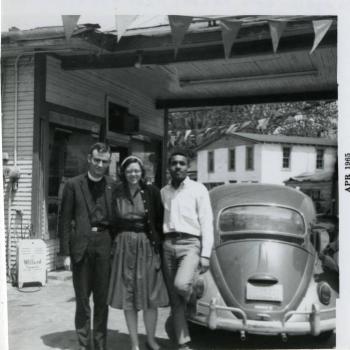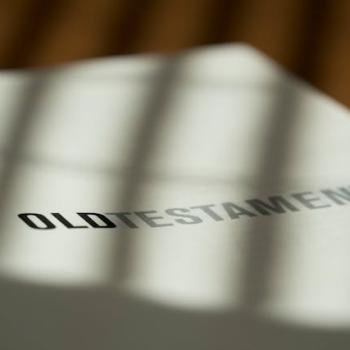Now Featured in the Patheos Book Club
The Bonhoeffer Reader
Edited by Clifford J. Green and Michael P. DeJonge
Author Q&A: Clifford J. Green and Michael P. DeJonge
Clifford J. Green is the executive director of the Dietrich Bonhoeffer Works English Edition and edited several of its volumes. Author of Bonhoeffer: A Theology of Sociality and other Bonhoeffer studies, he is professor of theology emeritus at Hartford Seminary, Connecticut.
Michael P. DeJonge is associate professor and graduate director in the Religious Studies department at the University of South Florida and the author of Bonhoeffer's Theological Formation.
Fortress Press recently completed the 16-volume Dietrich Bonhoeffer Works English Edition (DBWE) making available virtually all of Bonhoeffer's surviving works in English. As editors of The Bonhoeffer Reader you call this volume based on the DBWE a "theological" reader, and not a "biographical" or a "historical" reader. What are the differences?
MPD: Bonhoeffer's writings are interesting for many reasons, biographical, historical, and otherwise. This reader is self-consciously a theological reader, however, in that it includes above all the writings that are of theological interest. This is not to say, of course, that Bonhoeffer's theology admits of neat abstraction from either his life or historical circumstances; indeed the editorial introductions that precede the selections attempt to set his writings in biographical and historical context. But it remains the case that a different range of texts would have been included if The Bonhoeffer Reader were about, say, Bonhoeffer the preacher, Bonhoeffer the person, or Bonhoeffer and the Church Struggle. As it is, this reader is about Bonhoeffer the theologian.
For what type of users have you designed The Bonhoeffer Reader?
MPD: Fortress Press's recently completed English scholarly edition of Bonhoeffer's works, DBWE, is a monumental achievement; decades in the making, it drew on the labor, expertise, dedication, and generosity of an international team of scholars, translators, publishers, and donors. It makes available to the English reader virtually all of Bonhoeffer's surviving writings. DBWE, and the German edition it is based on, are the definitive resources for scholars from a number of disciplines who have reason to be interested in Bonhoeffer. Of course, the very things that make DBWE the definitive resource for scholars might not suit the general reader interested in Bonhoeffer the theologian, the beginning student of Bonhoeffer, or readers of recent Bonhoeffer biographies who might want to go deeper. The Bonhoeffer Reader is designed for such an audience. It collects a significant and representative range of Bonhoeffer's theological writings in one convenient and affordable volume.
What features of the book are most notable?
CJG: In one volume, Bonhoeffer's essential theological writings are collected together. The concise editorial introductions to each of the selections are invaluable, setting each selection into Bonhoeffer's life and providing historical context for his writing and its theological significance.
Also, the selection of writings in The Bonhoeffer Reader represents the whole Bonhoeffer—his groundbreaking dissertations, his biblical interpretation (e.g. Discipleship), and his provocative Ethics and theological letters from prison.
But we did not want to overwhelm readers with scholarly details, so we pruned notes with technical information available in DBWE, and added some notes to further clarify the text. And for those who wanted to work on the German Church Struggle and the Resistance conspiracy, we provided an appendix of resources; there's also an extensive bibliography.
MPD: I would just add that The Bonhoeffer Reader is set up so that one can move easily between it and the more exhaustive and authoritative DBWE. This is good for the student who reads an excerpt as presented in the collection and decides to write a term paper on that text. That student can easily go to DBWE for more detailed study. Similarly, it's handy for the teachers. If they are Bonhoeffer scholars, they will be doing their own reading in DBWE. The readings they assign their students from The Bonhoeffer Reader will be in the same translation, and instructors can easily read the areas around the excerpted text, so to speak, for their own preparation.
What about Bonhoeffer's theology do you think is most surprising for people who first discover Bonhoeffer as a historical figure?
CJG: First, people may be surprised by Bonhoeffer's originality as a thinker, an intellectual, a man who believed in the power of Christian ideas, and the need to reformulate them for a new, emerging era.




